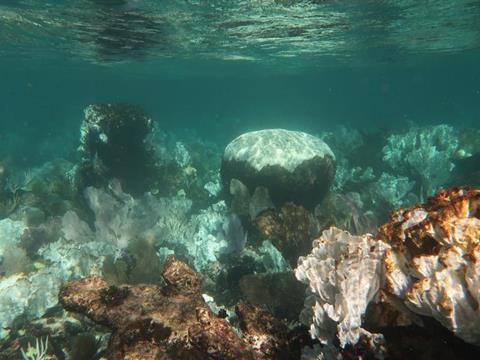Most coral reefs will soon stop growing and may begin to erode – and almost all will do so if global warming hits 2°C, according to a new study in the western Atlantic.

An international team, led by scientists from the University of Exeter, assessed 400 reef sites around Florida, Mexico and Bonaire.
READ MORE: Rising tides and microbes: how climate change Is reshaping aquatic life
The study, published in the journal Nature, projects that more than 70% of the region’s reefs will stop growing by 2040 – and over 99% will do so by 2100 if warming reaches 2°C or more above pre-industrial levels.
Climate change – along with other issues such as coral disease and deteriorating water quality – reduces overall reef growth by killing corals and impacting colony growth rates.
Fossil reefs
To understand how changing reef ecology is impacting reef growth potential – in other words, how the balance of living organisms translates into vertical “accretion” (reef-building) – the team analysed fossil reefs from across the tropical western Atlantic region to improve understanding of how reef growth rates vary depending on the types of coral present.
They then combined this with ecological data from more than 400 modern reef sites across the region to calculate present-day reef growth rates, and to explore how growth rates will change under future climate change, and whether reefs can keep up with future sea-level rise.
“Our research shows that under current CO2 emission scenarios most Atlantic coral reefs will not only stop growing but many will actually be eroding by mid-century,” said lead author Professor Chris Perry, of the University of Exeter.
“At the same time, rates of sea-level rise will increase – and our analysis suggests the growth of reefs will lag behind.
Opposite directions
“With reefs and sea levels moving in opposite directions, water depths above reefs will increase – raising flooding risks along vulnerable reef-fronted coasts and fundamentally changing nearshore ecosystems.
“Resultant water depth increases of around 0.7m are projected by the end of this century if global temperature increases exceed 2°C, and as much as 1.2m under higher warming rates.”
Reef growth is strongly influenced by the amount and types of living coral present.
Multiple factors including disease outbreaks and “bleaching” events caused by high temperatures have changed the makeup of many reefs – depleting key reef-building species.
Alarming decline
“We are witnessing an alarming decline in both the abundance and diversity of corals across Atlantic coral reefs,” said co-author Dr Lorenzo Alvarez-Filip, from the Universidad Nacional Autonoma de México.
“Climate change is not only accelerating this decline but also worsening the cascading ecological and socio-economic consequences of their loss.”
Co-author Dr Didier de Bakker, from the University of Exeter, said: “The changes we project would have major impacts along coastlines where reefs presently help limit wave exposure.
“These changes would also transform the environmental conditions in nearshore lagoons which harbour important habitats such as seagrass beds.”
Coral restoration
One strategy to reverse losses and enhance reef growth is coral restoration.
Dr Alice Webb, also from the University of Exeter, said: “The scale of action required to reverse current coral losses is significant.
“To have meaningful effects on limiting water depth increases, any restoration will need to occur in tandem with effective land and water management, and rapid climate mitigation actions. Actions to keep warming below 2°C are critical.”
Critical period
Professor Perry concluded: “We are moving into a period where the two factors that control water depths above coral reefs – vertical reef growth rate and sea level rise rate – are starting to operate in increasingly divergent directions.
“Limiting climate warming is critical if we are to try to mitigate this and to avoid the worst impacts for coastlines and coastal ecosystems.”
The paper is entitled: “Reduced Atlantic reef growth past 2°C warming amplifies sea-level impacts.”







No comments yet